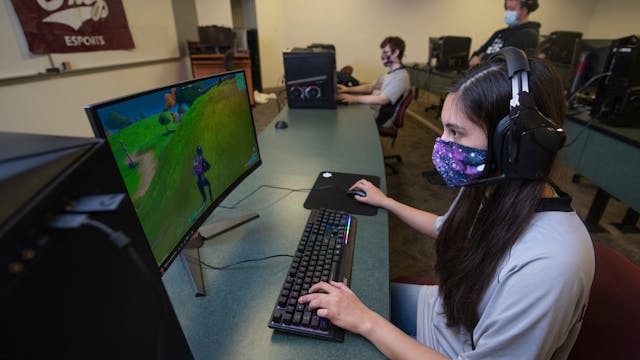Esports programs are growing at colleges across the country for their ability to attract and engage students—just like traditional sports.
But higher education serves all kinds of students, and the gaming community isn’t exactly known as a bastion of inclusivity (remember Gamergate?). How can colleges create esports programs where everyone feels like they can join?
Michael Cassens at the University of Montana has a solution. As the university’s esports director, he founded the program not with an eye toward tournament wins but on ideals of diversity, equity and inclusion.
“A lot of esports teams—I don’t fault them one bit—they’re highly competitive. I’m not against winning, I just don't necessarily care,” says Cassens, also an assistant professor of gaming and interactive media. “I’m happy if our teams win, and they’ve taken the championship, but I’m more concerned with how they are doing. What can we do to help you through this time in life?”
The reality is that very few of his 250 active student players are going to become professional gamers. But the way Cassens sees it, all of them can benefit socially and academically from the community aspect of the esports program.
To hear his students tell it, the strategy is working.
Building An Inclusive Community
In interviews with 15 representatives of collegiate esports programs published this summer, EDUCAUSE found that higher education leaders agreed that the best way to foster inclusion is by confronting toxic gaming behavior head-on.
At the University of Montana, esports player and fine arts student Canyon Hardy says coaches and staff make it clear that any harassment will get students booted from the program. That’s a departure from the gaming environments that Hardy, who uses they/them pronouns, was used to prior to joining the university’s team for Overwatch, a team-based shooting game.
“The Overwatch community is not great. I get misgendered all the time when I’m playing with randos and [told] sexist stuff like, ‘Girls shouldn't be allowed to play this game,’” Hardy says.
Not so at the university, they add: “I personally feel very safe. I can’t speak for every transgender person in the program, but it’s very out there that, ‘We are not going to send you away or tolerate hate.’”
Cassens’ approach to esports is based on “radical welcome” where students feel comfortable participating no matter their race, gender or sexual orientation. Part of that includes growing teams that aren’t based on first-person shooter games, which he says don’t always appeal to women. When the program created a Tetris team, five women joined right away.
“The woman who was the captain would routinely beat people by hundreds of thousands of points,” Cassens says. “It’s about meeting the players where they are and trying to be aware of, ‘What needs do you have, and how can we fulfill those?’”
University esports teams also remove the financial barrier that students face in buying expensive gaming equipment that’s needed at the competitive level. Cassens says cost is a common hurdle for teams that play at the club level.
“If you don't have to worry and you can just come and play, that also creates the feeling of, ‘I can be part of this, too,” he says.
Hardy, who has started coaching other Overwatch players, says that one of the best parts of being on the team is hanging out after practice. Students spend Thanksgiving and Christmas together, and even the quiet players have come out of their shells.
“We’re all really close friends now, and that’s the biggest thing that all of us got out of the program,” Hardy says. “Having a place where we can all gather and have fun together.”

A Win-Win Situation
Like in traditional collegiate sports, students in Cassens’ junior varsity and varsity esports teams have to keep up their grades if they want to play. When staff tried to create an official peer tutoring program, students said there was no need.
“They just help each other. When we were all at home, they still supported each other online, Cassens says.
When it comes to a return on investment, according to EDUCAUSE’s research, schools reported that esports programs give students opportunities for social and leadership growth. For universities, some found high schoolers were asking about their esports team by name during the application process.
Tessa Johnson, a sophomore studying business, says she spoke to Cassens about the esports program before she enrolled at the University of Montana. A League of Legends player, she moved up to the varsity team during her second semester.
“I think it’s made me more confident in myself. In a game like League, you can't make calls that are like, ‘I think maybe we can do this, but don’t know,’” Johnson says, “because it's going to fall apart.”
There’s another benefit to being on the team: It’s a huge motivator for her to do well in classes, even when the semester gets rough.
“Sometimes you're like, ‘I don’t know if I want to do this, but all my friends are playing in this. I don’t want to leave,’” Johnson says. “This is where I find a lot of joy, so it's a big motivator for staying enrolled and getting good grades.”
Cassens says he’s noticed that esports program leaders are thinking more about diversity, and it’s an encouraging trend. He doesn’t want any student to feel tokenized, but he says there’s a lot of good that having an inclusivity mindset can bring.
“If we get away from win-loss and think more of ‘everyone wins if we just open the door,’ what greater thing is there?” Cassens says. “There’s so much more to it in life than, ‘I won X championship against someone.’”


